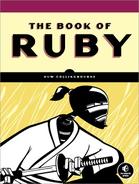Finally, let’s return to the program you looked at earlier: eval4.rb. This, you may recall, prompts the user to enter strings to define code at runtime, evaluates those strings, and creates new runnable methods from them.
One drawback of that program was that it insists that each method be entered on a single line. It is, in fact, pretty simple to write a program that allows the user to enter methods spanning many lines. Here, for example, is a program that evaluates all the code entered up until a blank line is entered:
writeprog.rb
program = ""
input = ""
line = ""
until line.strip() == "q"
print( "?- " )
line = gets()
case( line.strip() )
when ''
puts( "Evaluating..." )
eval( input )
program += input
input = ""
when '1'
puts( "Program Listing..." )
puts( program )
else
input += line
end
endYou can try this by entering whole methods followed by blank lines, like this (just enter the code, of course, not the comments):
def a(s) # <= press Enter after each line
return s.reverse # <= press enter (and so on...)
end
# <- Enter a blank line here to eval these two methods
def b(s)
return a(s).upcase
end
# <- Enter a blank line here to eval these two methods
puts( a("hello" ) )
# <- Enter a blank line to eval
#=> olleh
puts( b("goodbye" ) )
# <- Enter a blank line to eval
#=> EYBDOOGAfter each line entered, a prompt (?-) appears except when the program is in the process of evaluating code, in which case it displays “Evaluating,” or when it shows the result of an evaluation, such as olleh.
If you enter the text exactly as indicated earlier, this is what you should see:
Write a program interactively.
Enter a blank line to evaluate.
Enter 'q' to quit.
?- def a(s)
?- return s.reverse
?- end
?-
Evaluating...
?- def b(s)
?- return a(s).upcase
?- end
?-
Evaluating...
?- puts(a("hello"))
?-
Evaluating...
olleh
?- b("goodbye")
?-
Evaluating...
EYBDOOGThis program is still very simple. It doesn’t even have any basic error recovery let alone fancy stuff such as file saving and loading. Even so, this small example demonstrates just how easy it is to write self-modifying programs in Ruby.
